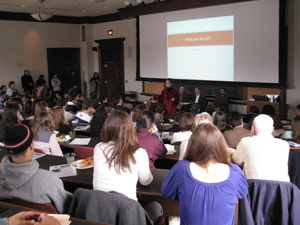 Students interested in learning about and helping the people of Haiti recover from the devastating earthquake of Jan. 12 can get involved through a number of opportunities organized at Lafayette, including a benefit dance marathon, donation drives, discussion forums, and a possible service trip to the country.
Students interested in learning about and helping the people of Haiti recover from the devastating earthquake of Jan. 12 can get involved through a number of opportunities organized at Lafayette, including a benefit dance marathon, donation drives, discussion forums, and a possible service trip to the country.
The College is partnering with Hands Together, a nonprofit organization dedicated to educating and serving the needs of the poor in Haiti. It was founded in the mid-’80s by Father Tom Hagan, former Lafayette chaplain, and Doug Campbell ’86 now serves as its executive director.
According to Bonnie Winfield, director of the College’s Landis Community Outreach Center, donations can be made directly to Hands Together though the Landis Center’s Haiti Response web site.
The center will host a concert and dance marathon benefiting Hands Together 6 p.m.-2 a.m. Saturday, Feb. 27, in Farinon College Center. Students also will be collecting quarters for Haiti in Farinon to help raise funds for those affected by the earthquake.
Winfield also stressed that the Landis Center is envisioning an even more substantial outreach effort. Plans are in motion to organize a service trip for students, faculty, staff, and alumni to assist Hand Together in the rebuilding efforts.
Lafayette faculty hosted two multidisciplinary forums focused on the earthquake and relief efforts. The first session, dealing with the historical and scientific background of the region, was held Jan. 29.
The second session took place Feb. 5. Speaking to a standing-room-only crowd in room 104 of Kirby Hall of Civil Rights, Stephen Kurtz, associate professor of civil and environmental engineering, discussed structural engineering practices necessary in areas where earthquakes are common, such as the use of steel to reinforce masonry, and the obstacles a country like Haiti has in the availability of steel.
Steve Lammers, Helen H.P. Manson Professor Emeritus of the English Bible, spoke about how the lack of medical resources and personnel is affecting Haitians. He stressed that amputations and other operations are being performed with limited resources and little post-operative wound care, which could lead to more amputations in the future.
David Stifel, assistant professor of economics, brought up the problem of government ineffectiveness as it relates to the reconstruction of Haiti. One of his recommendations dealt with government funds. “If you strengthen the budgeting capacity and make it more transparent, there’s less room for leakage–that’s a nice word for corruption,” he explained. “Less leakage means more effective implementation of government budgeting. This is necessary for long-term growth in Haiti that is not imposed or facilitated entirely by the international community.”
Winfield also discussed the College’s relief efforts with Hands Together at the forum.
The open forums were sponsored by the Offices of the President and the Dean of the College, the Landis Community Outreach Center, the Division of Engineering, the Department of Economics, and the Department of Government & Law.
